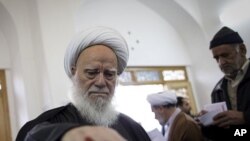Iranians across the country are choosing a new parliament, in a vote seen as a test between conservatives who support and others who oppose President Mahmoud Ahmadinejad.
Parliamentary Election Facts
- Candidates are cleared by the Guardian Council.
- 3,444 candidates are running out of the 5,395 who registered.
- Parliament has 290 seats.
- Voters must be over 18 years old.
- 48 million people of Iran's 74 million strong population are eligible to vote.
- Ballots are counted manually.
Some 3,400 candidates are vying for seats in the 290-member parliament. Friday's election, which is the first since the disputed 2009 presidential election, is being boycotted by Iran's main opposition and reformists groups. Iran's conservative government and clerical leaders have pursued a crackdown on the reformist movement since it staged mass protests against Ahmadinejad's re-election.
More than 48 million Iranians are eligible to vote in Friday's election.
Turnout
Iranian Supreme Leader Ayatollah Ali Khamenei has appealed for a big turnout that he says would represent an act of defiance toward Iran's enemies - a reference to Western powers leading a sanctions campaign against the Iranian economy.
Western powers have been tightening sanctions to pressure Iran into stopping nuclear activities they fear are aimed at producing weapons. Iran says its nuclear program is peaceful.
Iranian reformist leaders have been jailed, kept under house arrest or otherwise excluded by clerics from competing in the parliamentary vote. They have called on Iranians to boycott it.
Conservatives
Since Ahmadinejad's re-election, Iran's dominant conservative movement has largely splintered into factions that support him or reject him for presiding over a weakening economy and challenging the Supreme Leader in appointments of government officials.
The presidency in Iran is an administrative office rather than an executive role, as in many other countries. The Iranian president implements policies set by the supreme leader and laws approved by parliament, and selects Cabinet ministers, subject to parliamentary approval. The supreme leader has the final say on nominees for ministers of Defense, Foreign Affairs and Information and Culture.
Monitors
Iran's Guardian Council says no outside organizations will be permitted to monitor the turnout or vote-counting process. The clerical body vets parliamentary candidates and validates poll results.
Council spokesman Abbas Ali Kadkhodaei said Thursday the presence of international observers would be an "insult" to the Iranian people, whom he said have decided their own fate since Iran's 1979 Islamic Revolution.
Iran's semi-official Fars news agency quoted Tehran governor Mohsen Nayebi as saying 350 foreign journalists are accredited to cover the election.
"Our brave nation took part in the Islamic Revolution more than thirty years ago and took hold of their destiny and didn't allow any intervention from foreign bodies or countries," he said. "In my opinion, such comments are insults to the common sense of our people."
Some information for this report was provided by AP, AFP and Reuters.
| Join the conversation on our social journalism site - Middle East Voices. Follow our Middle East reports on Twitter and discuss them on our Facebook page. |




